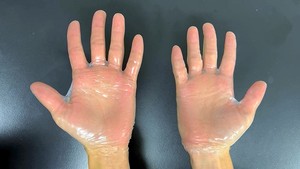THE ASAHI SHIMBUN
June 8, 2023 at 07:00 JST
The Defense Ministry will consider lifting its ban on tattoos to enhance recruitment in the personnel-depleted Self-Defense Forces, but aversion to the body art still runs deep around the nation.
Although tattoos have increasingly been used as fashion statements, especially in overseas countries, they are still associated with yakuza gangsters and other “anti-social elements” in Japan.
Candidates for the SDF can be disqualified for several reasons listed in a ministry directive, including “having tattoos.”
The directive is based on Article 58 of the Self-Defense Forces Law, which states that SDF members must maintain grace at all times. The tattoo ban was included from the start of the SDF in 1954.
According to sources, some applicants have been rejected because of the ink.
However, the ministry now faces a chronic labor shortage in the SDF at a time when Japan is expanding its spending and activities for the defense of the nation.
Masahisa Sato, a lawmaker of the ruling Liberal Democratic Party, raised the tattoo ban at the Upper House Committee on Foreign Affairs and Defense on May 9.
“I think it is problematic to reject those willing to enlist just because they have small tattoos,” said Sato, a former high-ranking member of the Ground SDF.
In response, a ministry official referred to the SDF’s measures aimed at ensuring maximum effectiveness of its human resources, ranging from recruiting and training to providing well-being support for its members.
“We must consider how the ‘human foundation’ should be managed,” the official said.
A different senior ministry official also said revisions are necessary in this age of diversity, noting that tattoos worn by Ainu indigenous people would also be a reason for rejection.
However, negative views toward tattoos remain within the SDF.
“For example, they (tattooed members) could give a scary impression to disaster victims when we operate in disaster-stricken areas,” said a 50-year-old SDF member based in Fukushima Prefecture.
Although an increasing number of young people in Japan wear tattoos for fashion, a Japan Trend Research survey covering 1,200 people in 2021 showed that only 3 percent have tattoos.
When asked what they think about tattooed customer-serving employees, 54.8 percent of respondents said they felt uncomfortable with the body art, while 10.5 percent said they have no problem with the ink.
A 41-year-old company employee living in Tokyo had his family emblem tattooed on his back when his child started elementary school five years ago.
His company does not know about the tattoo because it is usually covered by clothing.
“It is such a waste to reject applicants fit for a job just because of external factors,” he said. “I hope inclusive measures will be considered (at the SDF).”
A 20-year-old woman received a 5-centimeter rose tattoo on her waist two years ago because she thought it would look cool.
But it caused a problem at an “izakaya” pub where she worked part time, resulting in her quitting the job.
She recently visited a tattoo parlor in Tokyo’s Shibuya district to seek advice for a second tattoo.
“I think it is only in Japan where people with tattoos are considered unusual,” she said.
PECULIAR TO JAPAN
Yoshimi Yamamoto, a cultural anthropology professor at Tsuru University who is well-versed in tattoo culture, said Japan’s historical background plays a major role in this issue.
According to the professor, tattoo culture spread in Japan during the Edo Period (1603-1867). Although tattoos were used as art, authorities also tattooed criminals as a form of punishment back then.
After the turn of the Meiji Era (1868-1912), authorities tried to conceal naked and tattooed individuals to prevent Japan from being viewed as “barbaric” by foreigners, Yamamoto said.
Tattoos became widely viewed as anti-social after several yakuza movies were produced starting in the 1960s.
“Tattoo culture divides people into two groups: those who don’t mind them and those who are absolutely against them,” Yamamoto said. “I think many citizens cannot accept public servants with tattoos."
Although tattoos are increasingly viewed as fashion statements, it is also true that they have negative connotations in Japan, she said.
“Even if tattooed candidates become eligible to join the SDF, I think the taboo feelings for tattoos wouldn’t change much in Japan,” the professor said.
(This article was written by Kaigo Narisawa and Natsuki Edogawa.)




















Stories about memories of cherry blossoms solicited from readers
Cooking experts, chefs and others involved in the field of food introduce their special recipes intertwined with their paths in life.
A series based on diplomatic documents declassified by Japan’s Foreign Ministry
A series on the death of a Japanese woman that sparked a debate about criminal justice policy in the United States
A series about Japanese-Americans and their memories of World War II
Here is a collection of first-hand accounts by “hibakusha” atomic bomb survivors.